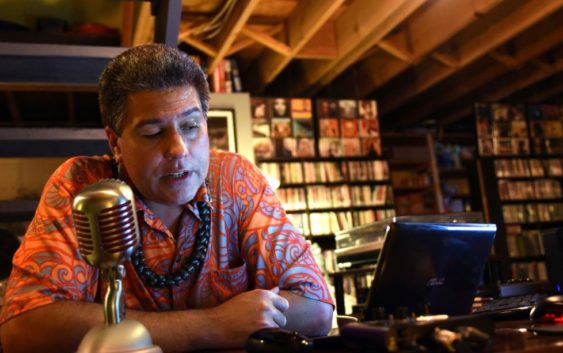Kuleana – The Ho`olohe Hou Radio Story

Photo Credit: William Johnson for the Bucks County Courier Times
Kuleana: The Ho`olohe Hou Radio Story
I call you “my friend.” But I haven’t responded to your phone call, text message, or email in weeks. Maybe months. You wonder what I do with my time.
Every morning at 4am I wake up and write about Hawaiian music. Because everyday there is something new to celebrate about the history of Hawaiian music and its legendary artists. A birthday. A passing. An important recording session. I write about 500 words every morning. Often that becomes a post on my Hawaiian music webzine. More often it becomes a segment called “This Day In Hawaiian Music History” to go to air that day. The hardest days are those when there is more than one historic event to celebrate. There are some days when I write as many as four such pieces. 2,000 words. On those days I have to start writing the night before.
Last month alone I wrote more than 20,000 words about the history of Hawaiian music and its musicians. At that rate, this means I write the equivalent of three average-sized books about Hawaiian music every year. Most of it is based on original research. I refer to my life as a “practitioner inquiry” – the academic phrase for “learning by doing.” Because I am not merely an armchair fan of Hawaiian music. I also play all of the instruments in a typical Hawaiian band and know hundreds of Hawaiian language songs by heart.
But the work does not stop there. Those historic pieces need to be recorded and edited for airplay. (You can sample a few of these by clicking here.) And, of course, nobody wants to hear why a piece of music is historically or culturally important without actually hearing the music. I spend the rest of my time remastering recordings that are no longer commercially available in order for you to actually hear who and what I am talking about. I have remastered tens of thousands of these recordings dating back 100 years – music you cannot simply dial up on Spotify, Tidal, Pandora, Amazon, or Apple Music. Most who claimed to love Hawaiian music threw away those vinyl and shellac relics eons ago. Now a scant few copies exist in private collections and university libraries. But such greatness cannot be contained by brick-and-mortar or even by selfishness.
I have done this every day for the last four years. This is my life. This is Ho`olohe Hou Radio.
Ho`olohe Hou Radio has been a blessing and a curse. The time spent working on preserving this music and the legacies of artists who might otherwise be forgotten is also the reason I haven’t finished remodeling the kitchen or building bookcases for the thousands of books I haven’t read yet. It is least rewarding when naysayers say it is no different than anything that has ever been done before in the history of Hawaiian music radio. It hurts like hell. Because I know that those who think least of Ho`olohe Hou Radio have never tuned in for one minute to find out what makes it different. Ho`olohe Hou Radio is compared to everything that came before it. Sure, out-of-print Hawaiian music has been presented on the radio before – usually for an hour once a week. Imagine the effort it takes to put together a one-hour-a-week radio program. Now multiply that by seven. Because I spend 3-4 hours/day to ensure that the programming at Ho`olohe Hou Radio changes every day.
Ho`olohe Hou Radio has also been costly. The total operating costs each year exceed $5,000. The first year was paid for through a Kickstarter campaign. But the subsequent years have been paid for through my performances. In other words, in order to support Hawaiian music the way it deserves to be supported, I have had to perform Hawaiian music – every penny from my performances going toward the operating costs of Ho`olohe Hou Radio.
Last year alone HHR boasted more than 16,000 listeners. Of that whopping total, only nine listeners have pledged their support. Listeners are often friends and family, so I am able to ask them directly… What keeps you from supporting a product you actually use? The question I am really asking is… Why are people who are willing to pay for almost anything else expect Hawaiian music to be free? The most frequent response is that they do not support Ho`olohe Hou Radio because it wasn’t chartered as a not-for-profit. I am currently (between my myriad other responsibilities) writing an entire article to explain why I chose not to incorporate Ho`olohe Hou Radio with not-for-profit status. But I can boil it down to a few simple points:
- Not-for-profit status requires a lot of upfront expense and a great deal more on-going paperwork to comply with not-for-profit reporting standards. Ho`olohe Hou Radio cannot afford the lawyers, accountants, and consultants required to obtain and maintain not-for-profit status.
- A not-for-profit exists as a separate entity apart from its founders. This means a great deal of internal debate and politics. Ho`olohe Hou Radio was and continues to be built on my vision, and there is nothing more demoralizing than a Board of Directors micromanaging day-to-day operations – such as telling me to play Iz’s “Over The Rainbow” in order to capture a greater share of the market.
- All of the grant funding for not-for-profit endeavors in Hawaiian music come from the State of Hawai`i and are open to Hawai`i residents only.
- Not-for-profit status largely limits revenue-generating activity to listener donations because of the limited scope in which a not-for-profit can operate. For example, if Ho`olohe Hou Radio were not-for-profit, selling on-air advertising would likely be considered revenue unrelated to the mission and could subject the station to Unrelated Business Income Tax (UBIT).
- The only clear benefit of a not-for-profit is its tax-exempt status – which is of little importance to an enterprise like Ho`olohe Hou Radio which to date has never turned a profit.
Not-for-profits compete in an already overcrowded market of more than 1.5 million not-for-profits for donor dollars. But few consumers question whether or not they have to choose between their daily Starbucks or donate to the Red Cross. Humans prioritize, and most are willing to pay for products they actually use and enjoy. The only perceived benefit to the donor of a not-for-profit is a tax write-off. But nobody gives tax write-offs a second thought when spending $9.99/month for Spotify, Pandora, or Sirius/XM Radio. Nobody has ever asked why KINE, KCCN, KPOI, KSSK, KUMU, or KAPA aren’t not-for-profit. Most are corporate owned. All are for-profit.
Rather, Ho`olohe Hou Radio is a mission-conscious, socially responsible for-profit. Everything I do is with an eye or an ear toward contributing to the growing academic corpus around Hawaiian music. It aims to teach as it entertains – a first-time experiment in “Hawaiian music edutainment.” It is the NPR or PBS of Hawaiian music. Every penny earned to date has gone immediately back into improving the quality and services Ho`olohe Hou Radio provides. Just like a not-for-profit.
Ho`olohe Hou Radio is not seeking donors. It is seeking funders. But, more importantly, it is seeking listeners. Because I would never ask someone to pay for a product they don’t use. With a library of more than 12,000 songs (and growing by the day), listen to Ho`olohe Hou Radio for just an hour, and you will hear an artist or a song you have never heard before. If you don’t appreciate what you hear, I’d like to know why. (Call it “market research.”) Drop me a note at the email address below or call at the telephone number below to chat about what you like or don’t like about Ho`olohe Hou Radio. More importantly, if you know somebody who might appreciate Ho`olohe Hou Radio, hit the SHARE button. That costs absolutely nothing.
If after listening to Ho`olohe Hou Radio for a little while you think it is an important historical and cultural endeavor, then perhaps you would consider making your pledge of support. Simply click the SUPPORT link on our homepage to discover the additional benefits in store for you for helping keep alive Hawaiian music and artists which might otherwise be forgotten.
In Hawaiian, kuleana means so many things – some of them contradictory. Privilege. Concern. Business. Liability. Reason. Responsibility. Ho`olohe Hou Radio has been at various points in its history a privilege or a liability. But, on my most difficult days, Hawaiian music has been my sole reason to exist. And because Hawaiian music has gotten me through the toughest of times, Ho`olohe Hou Radio will always be my responsibility.
A century of Hawaiian music at your fingertips. This is Ho`olohe Hou Radio. This is my life. This is my kuleana.
Me ke ha`aha`a,

Bill Wynne
Creator/Host – Ho`olohe Hou Radio
Email: [email protected]
Telephone: 609-883-HULA (4852)

